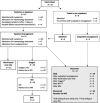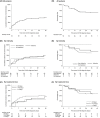Clinical outcomes and risk factors for severe COVID-19 in patients with haematological disorders receiving chemo- or immunotherapy
- PMID: 32678948
- PMCID: PMC7405103
- DOI: 10.1111/bjh.17027
Clinical outcomes and risk factors for severe COVID-19 in patients with haematological disorders receiving chemo- or immunotherapy
Abstract
Haematology patients receiving chemo- or immunotherapy are considered to be at greater risk of COVID-19-related morbidity and mortality. We aimed to identify risk factors for COVID-19 severity and assess outcomes in patients where COVID-19 complicated the treatment of their haematological disorder. A retrospective cohort study was conducted in 55 patients with haematological disorders and COVID-19, including 52 with malignancy, two with bone marrow failure and one immune-mediated thrombotic thrombocytopenic purpura (TTP). COVID-19 diagnosis coincided with a new diagnosis of a haematological malignancy in four patients. Among patients, 82% were on systemic anti-cancer therapy (SACT) at the time of COVID-19 diagnosis. Of hospitalised patients, 37% (19/51) died while all four outpatients recovered. Risk factors for severe disease or mortality were similar to those in other published cohorts. Raised C-reactive protein at diagnosis predicted an aggressive clinical course. The majority of patients recovered from COVID-19, despite receiving recent SACT. This suggests that SACT, where urgent, should be administered despite intercurrent COVID-19 infection, which should be managed according to standard pathways. Delay or modification of therapy should be considered on an individual basis. Long-term follow-up studies in larger patient cohorts are required to assess the efficacy of treatment strategies employed during the pandemic.
Keywords: Covid-19; chemotherapy; risk factors.
© 2020 British Society for Haematology and John Wiley & Sons Ltd.
Figures



Comment in
-
Impact of immunosuppression on mortality in critically ill COVID-19 patients.Br J Haematol. 2020 Nov;191(3):394-395. doi: 10.1111/bjh.17108. Epub 2020 Oct 26. Br J Haematol. 2020. PMID: 33103761 No abstract available.
References
MeSH terms
Substances
LinkOut - more resources
Full Text Sources
Medical
Research Materials

